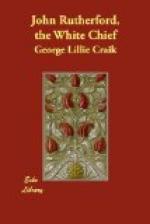“This great warrior showed us several of the heads of chiefs whom he had killed on this expedition, and these, he said, he intended to carry back with him to the Bay of Islands, to sell for gunpowder to the ships that touched there. He and his followers having taken leave of us, and set sail in their canoes, we also left the East Cape the day following, and proceeded on our journey homewards, travelling during the day, and encamping at night in the woods, where we slept around large fires under the branches of the trees. In this way we arrived in four days at our own village, where I was received by Eshou, my eldest wife, with great joy. I was much fatigued by my journey, as was also my other wife, Epecka, who had accompanied me.”
The person whom Rutherford here calls Bomurry is doubtless the chief described in most of the other recent accounts of New Zealand under the name of Pomaree, or Pomarree[BG], one of the most extraordinary characters in that country. He had taken this name instead of another by which he used to be called, Nicholas informs us, a short time before he first saw him in 1815, because he had heard that it was that of the king of Otaheite, according to the practice which prevails among his countrymen of frequently changing their names, and calling themselves after persons of whose power or rank they have conceived a high idea.
Pomaree is described by this gentleman as having been looked upon, even in his own country, as a monster of rapacity and cruelty, always involved in quarrels with his neighbours, and in the habit of stealing their property whenever he had an opportunity. Duaterra asserted that on a recent occasion he had made an incursion into his territory, and, without any provocation, murdered six of his people, the bodies of all of whom he afterwards devoured, not even their heads having escaped his gluttony, after he had stuck them upon a stick and roasted them at the fire.
The New Zealand chiefs, however, not excepting the most respectable among them, were found to be sadly given to calumniate one another by all sorts of fictions; and even Pomaree, bad as he really was, seems sometimes to have been worse reported of by the others than he deserved.
Upon another occasion Korro-korro told a long story about a design which he said had been formed to cut off the ship belonging to the missionaries, and of which he maintained that Pomaree was the principal instigator; but this was afterwards discovered to be a mere invention of that otherwise very honourable chief.
Notwithstanding Pomaree’s bad reputation, indeed, it is remarkable that we do not find a single instance anywhere recorded in which any European had reason to complain of his conduct. Nicholas was once dreadfully alarmed by the apprehension that he had decoyed away his friend, Marsden, to murder him; but was very soon relieved by the return of the reverend gentleman from a friendly walk which he had been enjoying, in the company of his supposed assassin, through one of the woods on his territory.




